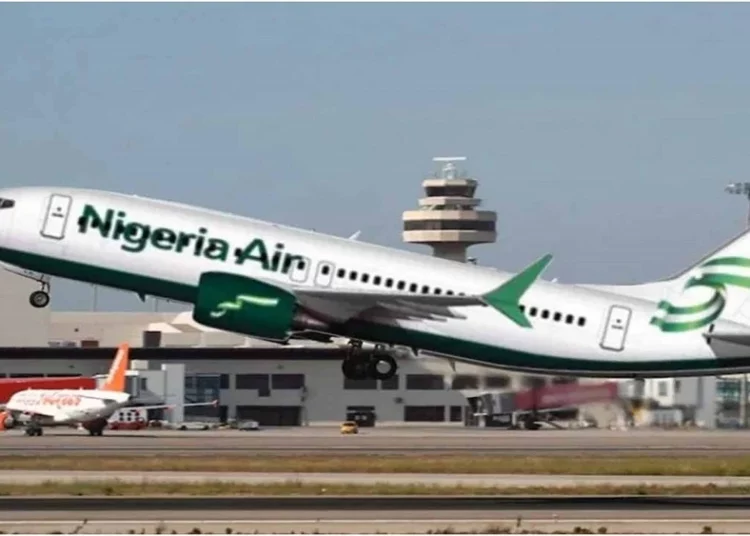One of the many campaign promises Nigerians especially elites will want President Muhammadu Buhari to fulfill before exiting office by May 29th, 2023, is the nation having a functional National Carrier.
The national carrier, though, every Nigerian’s pride, is however, suffering from aviation stakeholders’ confidence over what they termed a skewed shareholding structure of the airline.
According to stakeholders the 49 per cent shareholding structure given to Ethiopian Airlines was a misnomer for the nation’s aviation sector, saying the proposed national airline would help Ethiopian Airlines achieve its domination of the African market.
The aviation stakeholders argued that the Ethiopian national carrier had formed similar agreements in eight other African countries, thereby, rejecting the proposed Nigeria Air, saying its shareholding structure was absurd and could plunge the aviation industry into further chaos.
Speaking, president, Aircraft Owners and Pilots Association of Nigeria (AOPAN), Mr Alex Nwuba, said with Ethiopian Airlines having 49 per cent stake in the proposed national carrier, it would be difficult for Nigerian Air to fly intercontinental routes.
Nwuba, a former managing director of Associated Airlines and a pilot, said, “We do not think this is the best thing happening. It is not genuine. We reject it. Nigeria Air will not suffer any fate different from what befell the defunct Virgin Nigeria that could not go to the United States. This is clear in the Bilateral Air Services Agreement regulations.”
The aviation expert also queried why MRS and SAHCOL, listed as private investors in the proposed national carrier, had yet to inform their shareholders via the capital market their decision to invest in Nigeria Air.
“MRS and SAHCOL have yet to put up statements at the capital market to inform shareholders that they will be putting some money in the national airline. This is unethical,” he added.
Domestic airline operators also expressed concerns over the proposed partnership between the federal government and Ethiopian Airlines to form the national carrier.
The airlines under the aegis of the Air Operators of Nigeria (AON), said the agreement was tantamount to opening the nation’s domestic market to a foreign carrier; a development they said could ‘decimate” the local airline industry and lead to capital flight.
The spokesperson for AON, Prof Obiora Okonkwo, said, “We have not seen anything Nigerian in this Nigeria Air. It is a camouflage of interest. The decision to set up a national carrier in partnership with Ethiopian Airlines is a policy somersault. The people in government have continued to demonise the local operators. Aviation companies have collapsed in other parts of the world, not only in Nigeria. What the aviation sector needs is support. The private sector will collapse with this (national carrier) arrangement. Nigeria will be losing much. It must not be allowed to be sustained. There is nothing Nigeria in this Nigerian Air.”
The managing director of Top Brazz Aviation and former Managing Director of the Nigerian Airspace Management Agency, Roland Iyayi, said the proposed national airline would help Ethiopian Airlines to achieve its domination of the African market, adding that the Ethiopian national carrier had formed similar agreements in eight other African countries.
He said, “This approach will decimate the local market. Agreement with Ethiopian Airlines will create cabotage. Ethiopian Airlines will come into our domestic market, lower fares (non-competitive fares) with the aim of taking over the market. The choice of Ethiopian Airlines will destroy our industry. We reject this totally.”
Iyayi, who is also a pilot, further said, “In anticipation of the Single African Air Transport Market, Ethiopian Airlines want to dominate the African market. The government is meant to support local carriers. Ethiopian Airlines has partnerships in eight other countries in Africa.
“ET currently has 135 planes. The CEO of the airline has said its plan to increase their fleet to 250 planes in the next five years. The intent is to go into the domestic market of all the African countries where they have footprints. This is simply aviation colonialism. If we take all of this onboard, you will wonder whether the government has the interest of Nigerian airlines at heart or not.”
“What Ethiopia is trying to do in essence is to make sure they have a hold on the largest market in the continent, to be able to project and propel themselves to Nigeria. They intend to double (the number) by 2050. Ethiopia as a country does not really have that market but they have a footprint in several local markets.
“Ethiopia will not help you to create an aviation hub when it has one in Addis Ababa. They are building a new airport. It will be very difficult to see how Ethiopia will commit to a national carrier in Nigeria that will be for the benefit of Nigerians. We dare to say, as AON, that if airplanes are brought into the Nigerian market, the first thing Ethiopia will do, as a strategy, is to do a fare cutting strategy for market penetration. When you cut the fares to compete with the local carriers—Ethiopia is awash with cash —they can afford to come to the market and project a six-month fare with domestic carriers.
“I can guarantee you that if they do that for six months, 90 per cent of the domestic airlines will be out of business. Afterwards, they will now dominate the domestic market through their monopoly. What happens when they increase the fare? Ultimately, Ethiopia will fly international; it will be flying on Nigeria’s designated routes.”
According to the chief executive officer, West Link Airlines, Capt Ibrahim Mshelia, Nigeria has the capacity to establish its own national carrier without a foreign airline.
He said, “This proposed national carrier should be stopped. The entity called national carrier is just a game to get what is touted as a national carrier owned by individuals. We have the capacity to establish our airlines. We should not allow ET to do it. Let an Ethiopian investor do it. The deal should be cancelled. It is an insult to our sensibility. We can develop our aviation sector. Some people just want to form a private carrier under the name of a national carrier.”
The assistant general secretary, Aviation Round Table, Olumide Ohunayo, also emphasised that though Ethiopian Airlines had been a successful carrier in Africa, its partner carriers on the continent such as Congo Airways, Tchadia Airlines, Zambia Airways and others, except Asky Airline, which just upped its fleet of aircraft to about 12, had all failed.
He said, “To me, this is not a good deal because we are back in the blocks again. We are leasing aircraft and crew on wet-lease, not even damp lease. With that we are probably taking all the revenues away. They will have to look for the scarce forex now to pay those crews.
“It is a win for Ethiopia as against Nigeria. If you look at all the airlines that Ethiopian Airlines has partnered with on the coast of Africa, you will see that none is successful, apart from Asky Airlines. Today, Asky is operating a direct Lagos-Johannesburg route, will this new carrier be competing with Asky on this route?”
The industry expert who expressed his fears about how much stake Ethiopian Airlines had in Nigeria’s national carrier, said, “Of all the seven airlines in africa that ET has shares, only ASKY operates beyond the domestic route, the remaining (in Chad, Mozambique, Zambia, Congo, Guinea and Malawi) are glorified local carriers. ASKY has 12 aircraft in 12 years.
“The govt has given multiple false start date of this airline and we have two of such dates this year that has failed. Part 9 of the Air Operator Certification and Administration 9.2.3.2 states that a new start up airline; “i. must have a minimum of three aircraft, ii. must be Nigerian registered. Yet we are told they are going to wet lease and later damp lease aircraft to start. So why breech the Act from incubation, what happens later? The playing field is not level ab-initio.”
Speaking further, he said, “They announced wet leased aircraft and investment from the sovereign wealth fund which increase government exposure above five per cent. It was changed to damp lease and adverts placed for Nigerians to apply while the SWF was withdrawn from the list of investors quickly.
“Virgin Nigeria was stopped from operating into the United States because of 49 per cent ownership by Virgin Atlantic. Hope this will not play out again for some countries?”
Ohunayo, while speaking to The Punch, asked what ET would be offering Nigerians as compared to Virgin Atlantic which offered 10 per cent shares to Nigerians as reciprocity for the investment in Virgin Nigeria. He asked if ET would be offering Nigerians shares in Ethiopia Airlines as reciprocity?
Speaking further, Ohunayo questioned why Eygpt Air, and two local airlines and other investors bid for the Ghanaian national carrier and only ET bid for Nigeria’s despite the huge market and potentials.
Unlike Nigeria, he wondered why the Ghanaian government threw all their bids out and picked the local airline, Ashanti Airline, as the core investor for their carrier?





